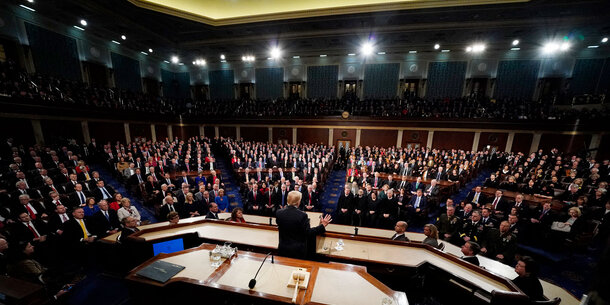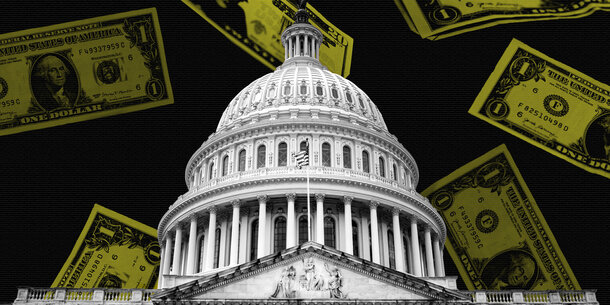At a recent Senate hearing on artificial intelligence (AI), Connecticut Sen. Richard Blumenthal stated that the subcommittee’s goal was “to demystify and hold accountable these new technologies to avoid some of the mistakes of the past.” 1 Missouri Sen. Josh Hawley expressed a similar view. “We could be looking at one of the most important technological innovations in human history,” he said, and cautioned that AI might be immensely destructive, analogizing it to the atomic bomb. 2
AI is just one of many highly technical issues confronting lawmakers. As Senator Blumenthal acknowledged, Congress has “failed to meet the moment on social media” — neither passing data privacy legislation nor modernizing platform regulation despite high-profile congressional hearings in 2018 that revealed not only social media’s role in election interference and data harvesting but also lawmakers’ ignorance of this technology. 3 Since then, legislation has stalled, in part due to the dubious claims of lobbyists for technology companies that such legislation would have unintended consequences.4
Congress has similarly struggled for at least a decade with other urgent science and technology issues.5 For instance, in 2009 Congress passed legislation to digitize medical records but did not address how to transfer records between hospitals, a costly oversight that slowed implementation despite a $30 billion federal investment.6 And in 2016 legislators drafted a bipartisan bill that received widespread criticism from technology privacy experts because it would have effectively banned end-to-end cellular encryption, which protects communications and data from hackers.7
Most public attention on Congress’s struggles to legislate has focused on partisan roadblocks — the increasingly sharp ideological divisions between the two parties and anachronistic procedural hurdles such as the Senate filibuster — that make decisive action a challenge, even during periods of unified party control.8 But a related driver of congressional dysfunction is lawmakers’ shrinking access to the high-quality research and data and nonpartisan expertise needed for them to comprehend complex technical issues. In a 2016 survey, 81 percent of senior congressional staffers said that access to high-quality, nonpartisan policy expertise was “very important,” but only 24 percent were “very satisfied” with the resources available.9
Congress has many in-house subject matter experts. Each member has personal staff, and each committee has staff from each party. Legislators are also assisted by a number of support agencies, including the Library of Congress and the Congressional Research Service (CRS) housed therein, the Government Accountability Office (GAO), the Congressional Budget Office, and the Government Publishing Office. Yet staff levels in Congress and at its support agencies have atrophied substantially over the past several decades, primarily as a result of cuts Congress has made to its own budget.10
Insufficient access to and absorption of high-quality, nonpartisan science and technology resources have many adverse consequences, including the allocation of billions of dollars in funding for technologies that do not work. These deficiencies also contribute to partisan gridlock because lawmakers increasingly rely on one-sided information from external sources — including those supported, directly and indirectly, by major political donors — making it harder to find common ground about basic facts and metrics for policy solutions.11
Whether dealing with climate change, emerging AI technology, or myriad other complex issues, Congress has a need for science and technology support that continues to grow.12 And while lawmakers have often issued broad statutory directives that defer to the expertise of executive branch agencies to fill in the gaps, the Supreme Court has put limits on the policymaking authority of those agencies.13 Congress itself will need to legislate with more frequency and greater detail in response to complex problems. It does not have the support it needs to fulfill this responsibility.
Lawmakers on both sides of the aisle agree that Congress would function better if it addressed its shrinking capacity to keep up with complex technical issues.14 It has already taken some positive steps, such as expanding GAO’s Science, Technology Assessment, and Analytics (STAA) department, which provides in-depth assessments of key technologies and related policies, as well as support for oversight of federal science programs.15 Congress has also created a new human resources hub and enhanced other relevant support services to improve staff recruitment and retention.16 In addition, a growing number of fellowships bring science and technology experts to Congress.17
While these measures are important, significant deficits remain, including insufficient staff, atrophied support agencies, and the absence of a systematic way to solicit expertise.
Based in part on interviews with current and former congressional staffers and scientists, this report outlines several steps Congress can take to improve its access to science and technology resources.
Many deficits can be addressed efficiently by allocating additional resources to STAA to launch a hub for collecting research and brokering relationships with experts. This hub would build on the support STAA currently offers members and staff and institutionalize a process for soliciting and absorbing technical expertise.
In addition to the expansion of in-house resources, Congress should create a bipartisan commission to consider ways to increase the use of evidence in its policymaking process, as Reps. Derek Kilmer and William Timmons propose in their recent Evidence-Based Policymaking Resolution.18
Lawmakers should also continue to fund and leverage recently added support resources, such as the new digital services team created for the House, to facilitate access to expertise across the country.19
Last, Congress should begin to institute longer-term structural reforms to better position itself to tackle complex, technical problems, for example by overhauling committee jurisdictions and investing in more staff with specialized expertise.
Congress must have the resources and support it needs to handle the nation’s most pressing contemporary challenges. These reforms will help it get there.
Endnotes
-
1
Cecilia Kang, “OpenAI’s Sam Altman Urges A.I. Regulation in Senate Hearing,” New York Times, May 16, 2023, https://www.nytimes.com/2023/05/16/technology/openai-altman-artificial-intelligence-regulation.html. -
2
Mack DeGeurin, “ChatGPT Creator Tells Congress He Wants an AI Regulatory Agency,” Gizmodo, May 16, 2023, https://gizmodo.com/chatgpt-ai-openai-sam-altman-congress-watch-hearing-1850440738. -
3
Rachel Kaser, “2018: The Year Congress and Social Media Collided,” Next Web, December 28, 2018, https://thenextweb.com/news/2018-the-year-congress-and-social-media-collided; Shannon Liao, “11 Weird and Awkward Moments from Two Days of Mark Zuckerberg’s Congressional Hearing,” Verge, April 10, 2018, https://www.theverge.com/2018/4/11/17224184/facebook-markzuckerberg-congress-senators; Emily Stewart, “Lawmakers Seem Confused About What Facebook Does — and How to Fix It,” Vox, April 10, 2018, https://www.vox.com/policy-and-politics/2018/4/10/17222062/mark-zuckerberg-testimony-graham-facebookregulations; and Daniel Howley, “Senators Say They Failed to Act on Social Media, Won’t Make Same Mistake with AI,” Yahoo! Finance, May 17, 2023, https://finance.yahoo.com/news/senators-say-theyfailed-to-act-on-social-media-wont-make-same-mistake-with-ai-195217014.html. -
4
Steven Pearlstein, “Opinion: Here’s the Inside Story of How Congress Failed to Rein In Big Tech,” Washington Post, July 6, 2023, https://www.washingtonpost.com/opinions/2023/07/06/congress-facebook-google-amazon-apple-regulation-failure/. -
5
Kang, “OpenAI’s Sam Altman Urges A.I. Regulation.” See also Grant Tudor and Justin Warner, The Congressional Futures Office: A Modern Model for Science & Technology Expertise in Congress, Harvard Kennedy School Belfer Center for Science and International Affairs, May 2019, 13, 16, https://www.belfercenter.org/sites/default/files/2019–06/PAE/CongressionalFuturesOffice.pdf (discussing Congress’s failures with respect to encryption and electronic medical records). -
6
Tudor and Warner, The Congressional Futures Office, 16; and Patrick Caldwell, “We’ve Spent Billions to Fix Our Medical Records, and They’re Still a Mess. Here’s Why.” Mother Jones, November/December 2015, https://www.motherjones.com/politics/2015/10/epic-systems-judith-faulkner-hitech-ehr-interoperability/. -
7
Andy Greenberg, “The Senate’s Draft Encryption Bill Is ‘Ludicrous, Dangerous, Technically Illiterate,’ ” Wired, April 8, 2016, https://www.wired.com/2016/04/senates-draft-encryption-bill-privacy-nightmare/; and Encryption Working Group, Moving the Encryption Policy Conversation Forward, Carnegie Endowment for International Peace, 2019, 3, https://carnegieendowment.org/files/EWG__Encryption_Policy.pdf. -
8
Tal Kopan, “Washington Is Poised to Return to Divided Government. Buckle Up,” Boston Globe, November 10, 2022, https://www.bostonglobe.com/2022/11/10/nation/washington-is-poised-return-divided-government-buckle-up/; and New York Times Editorial Board, “For Democracy to Stay, the Filibuster Must Go,” New York Times, March 11, 2021, https://www.nytimes.com/2021/03/11/opinion/us-filibuster-senate.html. -
9
Kathy Goldschmidt, State of the Congress: Staff Perspectives on Institutional Capacity in the House and Senate, Congressional Management Foundation, 2017, 17, https://www.congressfoundation.org/storage/documents/CMF_Pubs/cmf-state-of-the-congress.pdf. -
10
Zach Graves and Daniel Schuman, Science, Technology, and Democracy: Building a Modern Congressional Technology Assessment Office, Harvard Kennedy School Ash Center for Democratic Governance and Innovation, 2020, 10–14, https://ash.harvard.edu/files/ash/files/293408_hvd_ash_sciecne_tech_and_democracy_report.pdf. See also Alexander C. Furnas et al., “The Congressional Capacity Survey: Who Staff Are, How They Got There, What They Do, and Where They May Go,” in Congress Overwhelmed: The Decline in Congressional Capacity and Prospects for Reform (Chicago: University of Chicago Press, 2020), 92; and Jesse M. Crosson et al., “Partisan Competition and the Decline in Legislative Capacity Among Congressional Offices,” Legislative Studies Quarterly 46, no. 3 (August 2021): 745–89, https://doi.org/10.1111/lsq.12301. -
11
Nihal Krishan, “Rep. Derek Kilmer to Issue New Bill Pushing Congress to Incorporate Data and Evidence into Policymaking,” FedScoop, March 14, 2023, https://fedscoop.com/rep-derek-kilmer-to-issue-new-bill-pushing-congress-to-incorporate-data-and-evidence-into-policymaking/; Alexander Furnas, “Outsourced Congress: How Congress Relies on Outside Organizational Policy Information” (PhD diss., University of Michigan, 2020), 41, https://static1.squarespace.com/static/59e25521b7411c07ef1410fa/t/5f8643677023803e0f8d6213/1602634603545/Zander_Dissertation_Full_Submission.pdf; and Jonathan Lewallen, Sean M. Theriault, and Bryan D. Jones, “Congressional Dysfunction: An Information Processing Perspective,” Regulation and Governance 10, no. 2 (June 2016): 179–90, https://doi.org/10.1111/rego.12090. -
12
Tudor and Warner, The Congressional Futures Office, 18; Peter D. Blair, “Effective Science and Technology Assessment Advice for Congress: Comparing Options,” Science and Public Policy 48, no. 2 (April 2021): 165, https://doi.org/10.1093/scipol/scaa070; Bianca Majumder, “Congress Should Revive the Office of Technology Assessment,” Center for American Progress, May 13, 2019, https://www.americanprogress.org/article/congress-revive-office-technology-assessment/; and Marci Harris, “Congress vs. the ‘Pacing Problem[s],’ ” Medium, August 21, 2019, https://medium.com/g21c/congress-vs-the-pacing-problem-s-a887e3ca953f. -
13
Under long-standing Supreme Court precedent, federal courts defer to federal agencies’ expertise in interpreting ambiguous statutes, provided that their interpretations are reasonable. Chevron U.S.A., Inc. v. Natural Resources Defense Council, 467 U.S. 837 (1984). The Supreme Court is reconsidering this standard this term. Maya Kornberg and Martha Kinsella, “Whether the Supreme Court Rolls Back Agency Authority, Congress Needs More Expert Capabilities,” Brennan Center for Justice, May 30, 2023, https://www.brennancenter.org/our-work/analysis-opinion/whether-supreme-court-rolls-back-agency-authority-congress-needs-more. Meanwhile, in a number of recent rulings, the Supreme Court has limited the scope of federal agencies’ authority to respond to contemporary societal needs. See, e.g., Biden v. Nebraska, 600 U.S. __ (2023); and West Virginia v. EPA, 597 U.S. __ (2022). See also Mekela Panditharatne and Martha Kinsella, “Supreme Court Drastically Limits EPA’s Efforts to Mitigate Climate Crisis,” Brennan Center for Justice, June 30, 2022, https://www.brennancenter.org/our-work/analysis-opinion/supreme-court-drastically-limits-epas-efforts-mitigate-climate-crisis; Martha Kinsella and Jenna Pearlson, “The Supreme Court Case That Could Hamstring the Government’s Ability to Regulate Businesses,” Brennan Center for Justice, March 18, 2021, https://www.brennancenter.org/our-work/analysis-opinion/supreme-court-case-could-hamstring-governments-ability-regulate; and James Goodwin et al., In the Wake of West Virginia v. EPA: Legislative and Administrative Paths Forward for Science-Driven Regulation, Union of Concerned Scientists, 2022, https://www.ucsusa.org/sites/default/files/2022–10/In%20the%20Wake%20of%20West%20Virginia%20v%20EPA.pdf. -
14
See Select Committee on the Modernization of Congress, Recommendations to Foster Collaboration and Civility in Congress, to Modernize the Congressional Support Agencies, and to Encourage Evidence-Based Policymaking, U.S. House of Representatives, December 21, 2022, https://www.govinfo.gov/content/pkg/CRPT-117hrpt656/pdf/CRPT-117hrpt656.pdf. See also Graves and Schuman, Science, Technology, and Democracy. -
15
Tajha Chappellet-Lanier, “2019 in Review: The Year in Building Tech Capacity on Capitol Hill,” FedScoop, December 26, 2019,
https://fedscoop.com/2019-review-congress-tech-capacity/. -
16
Chris Cioffi, “They Tried to Modernize Congress. Now Time Is Running Out,” Roll Call, September 13, 2022, https://rollcall.com/2022/09/13/tried-to-modernize-congress-now-time-running-out/. -
17
Senate Employment Office, “Outside Fellowships and Internships,” accessed August 21, 2023, https://employment.senate.gov/outside-fellowships-and-internships/; American Association for the Advancement of Science, “Legislative Branch Fellowship,” accessed August 21, 2023, https://www.aaas.org/programs/science-technology-policy-fellowships/legislative-branch-fellowship; and Tech Congress, “The Congressional Innovation Fellowship,” accessed August 21, 2023, https://www.techcongress.io/congressional-innovation-fellowship. -
18
H. Con. Res. 49, 118th Cong. (2023). -
19
John Hewitt Jones, “House of Representatives to Launch New Digital Services Team,” FedScoop, January 20, 2022, https://fedscoop.com/house-of-representatives-to-launch-new-digital-service-team/.





